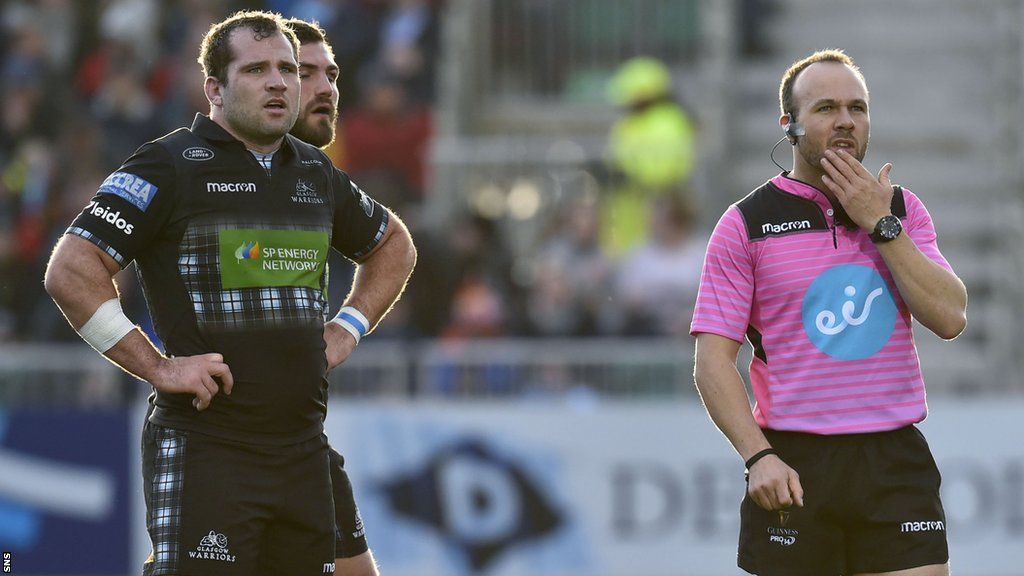Abuse has taken rugby to edge of precipice, says Scotland's Fraser Brown
- Published

Fraser Brown (left) has spent a decade at Glasgow Warriors
Champions Cup: Bayonne v Glasgow Warriors |
|---|
Venue: Stade Jean-Dauger, Bayonne Date: Friday, 16 December Kick-off: 20:00 GMT |
Coverage: Listen & follow live text commentary on the BBC Sport website & app |
Fraser Brown believes the abuse of officials and players has brought rugby union to the edge of a "precipice".
Speaking on the Scotland Rugby Podcast, the 34-year-old Glasgow Warriors and Scotland forward described the rising number of incidents of verbal intimidation, online abuse and, in some cases, death threats as "disgusting", "unwarranted" and a "cancer" in the game.
England and Saracens captain Owen Farrell recently announced he is stepping back from the Test arena for the foreseeable future in order to prioritise his and his family's mental well-being.
Farrell was then booed by Bulls fans in a Champions Cup match. Bulls coach Jake White condemned the treatment of the fly-half and apologised on behalf of the club.
Before Farrell's announcement, World Cup final television match official Tom Foley said he was taking a break from officiating international games after getting targeted online in the wake of the Paris denouement.
Wayne Barnes, the referee in the final, has spoken at length about the threats on his life and the lives of his family after that final between winners South Africa and New Zealand in Paris.
That was not the first time Barnes has been the focus of sinister behaviour, nor are Barnes and Foley the only officials who have been singled out.
Leinster fly-half Jonny Sexton was banned for three games after approaching match officials in a "confrontational, aggressive and disrespectful" manner after the Champions Cup final against La Rochelle in Dublin earlier this year.
Kiwi referee Ben O'Keeffe spoke about vile abuse he received after officiating Ireland's win over Australia in autumn 2022.
Nic Berry, the Australian referee, said he was the victim of a character assassination when Springbok director of rugby Rassie Erasmus rounded on his decision making in an hour-long video during the British and Irish Lions' tour of South Africa in 2021.
Berry was subjected to an amount of online heat after the video went public. Erasmus was banned for a year.
Retiring Rugby World Cup final referee Barnes on social media abuse
"You cannot get away from the fact that Owen Farrell is one of the greatest players to play for England," Brown said of the England captain. "You might not like the guy, or you might love the guy, but if you strip out all the emotion, he is one of England's best-ever players. He is one of the best captains there's ever been in the game.
"You don't measure a captain on whether the fans love him. You measure him by how much the players love and respect him.
"When you chat to players in the Saracens set-up and in the England set-up, they love him. He's hard on them, but they absolutely love him.
"To lose him from the international stage because of abuse he's getting, not just from his own fans but from his own media, I can't understand that.
"The criticism around his tackle technique was merited, but it went way beyond that - way, way beyond it. And he's not the only one, he's not the only player who is getting it. Referees are getting it. It's disgusting and unwarranted. With Owen, it was like a barrage of abuse and it was constant."
'Farrell situation may be tipping point'
Brown addressed why so few international players go into refereeing once their careers are over, saying: "Not many do it because of the abuse that comes their way.
"Players make umpteen mistakes every single game, but when a referee makes one mistake, he gets chastised and abused on social media. It's a little bit of a cancer in all sport, particularly rugby at the minute.
"The pressure and attention in the Test arena increases hundredfold. Everything is scrutinised. For players, it's physically brutal but also emotionally brutal, the intensity of it.
"I hope we can claw it back from the precipice and maybe the Owen Farrell situation will become a tipping point and make people go, 'right, we need to address this'. We're going to have to see some proper action for it to change."